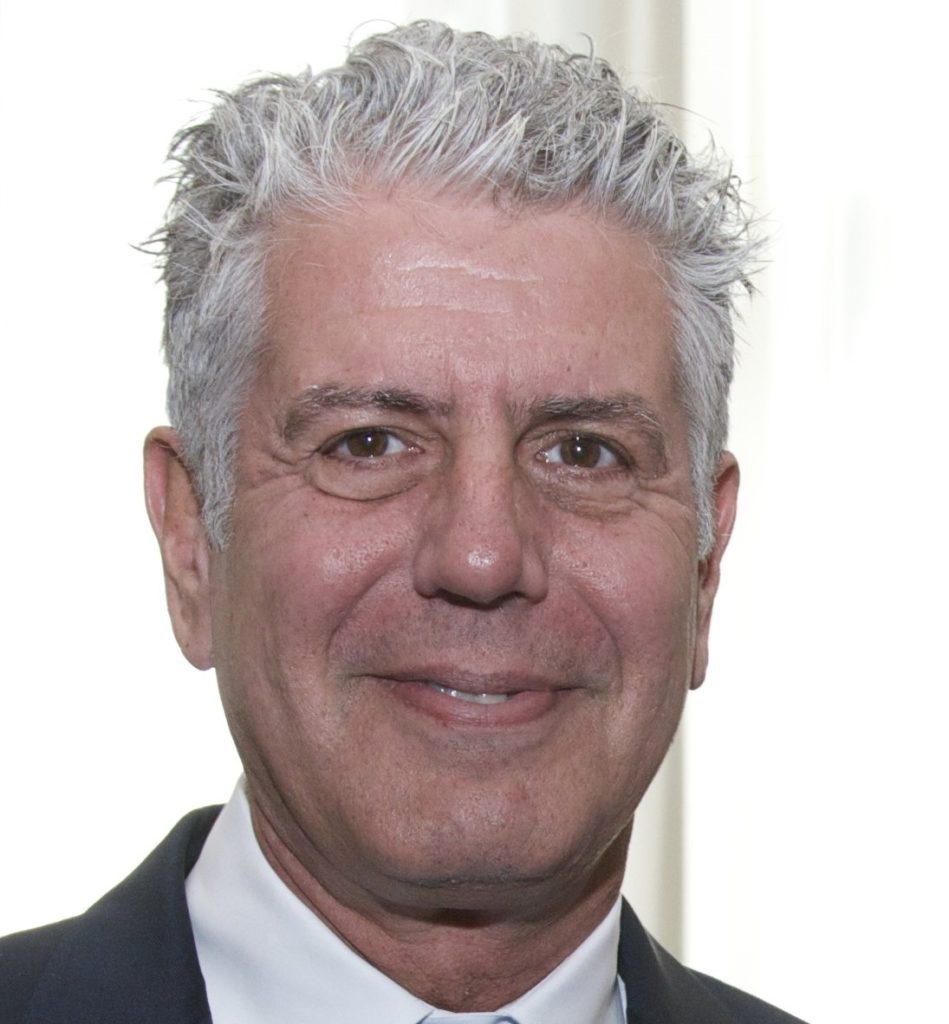
On Friday morning, we awoke to the sad news that Anthony Bourdain, the preeminent pioneer in the world of food tourism, had taken his own life. He was an icon. I was a fan. In many ways, Anthony Bourdain shaped my career.
Like many radio broadcasters, I have bounced from city to city across the country. Every few years, I seemed to pack up my belongings and find a new home. In the course of all my moving, I learned that every city is unique. Sometimes, I learned this lesson the hard way.
My radio career began at WBRU in Providence, in the shadow of the Boston music scene. I was a college student working at the station, and like most twenty-somethings, I thought I knew a lot more than I did. After graduating, I stuffed my belongings into a U-Haul and headed out to St. Louis, where I became the Imaging Director at 105.7 The Point. I was hired by Allan Fee, and every once in a while, we didn’t see eye to eye. I distinctly remember a heated discussion we had over a music imaging sweeper that I was creating. It was the early 2000s, and I thought we should include the song, “The Impression That I Get,” the 1997 modern rock hit by The Mighty Mighty Bosstones. Allan was opposed. I didn’t understand why.
What I didn’t realize at this early stage of my career was that my point of reference was distorted by my time in New England. Sure, the Bosstones could sell out five nights at the Middle East for their annual Hometown Throwdown, but that didn’t mean they were any more than a one-hit wonder hundreds of miles west in St. Louis.
Instead, St. Louis was in the midst of a long-term love affair with The Urge, a local band that could easily sell out a string of shows at Mississippi Nights. I only knew The Urge from their minor hit, “Jump Right In,” that we had played for a few weeks in Providence. But in St. Louis, they were gods. Looking back on that discussion now, I see it as an epiphany: This was when I first discovered how important it was for a radio broadcaster to understand and tap into the local culture. I realized that Allan was right, and I was wrong.
While sports has never been my strong suit, I quickly learned this was another arena in which it is vital for broadcasters to know their market. In fact, sometimes music and sports align. When I returned to Providence as WBRU’s Program Director, I embraced the Dropkick Murphys. If I were blindly following the music charts, I never would have touched this Boston punk band. Instead, we spun them more than any radio station in America. This paid off in spades when they released a song called “Tessie,” a re-imagining of a classic Red Sox anthem, just as the baseball team broke the Curse of the Bambino and won the World Series for the first time in 86 years. That song was not a hit anywhere else, but we had it in heavy rotation, because we understood the local culture.
Radio Terroir
The need to understand local culture extends far beyond just music and sports. Anthony Bourdain was one of the people who taught me that. During my brief tenure in St. Louis, I was exposed to a variety of regional dishes, including toasted ravioli, Imo’s pizza, and Ted Drewes ice cream. At the time, I didn’t recognize their significance.
But years later, I started a social dining group in Boston. This club introduced me to the world of local celebrity chefs. I saw surprising parallels between the culinary world and the world of rock and roll. On a national level, fans fawned over superstar chefs like Mario Batali, Wolfgang Puck, and Gordon Ramsay.
But among them all, Anthony Bourdain was unique. His straight-talking book, Kitchen Confidential, read like a rock star memoir, filled with tattoos, scars, and drug addiction. (I highly recommend listening to the audio version, which Anthony narrates himself.)
What made Bourdain stand out was his understanding of place. He was keenly aware of the fact that just like every city or town has a different music or sports scene, every locale has a different food culture. He loved using food as a gateway to explore different local cultures. He built a fascinating career out of it.
There’s a fantastic word in the culinary world: “Terroir.” It describes how the location where a food is grown impacts the flavor. It’s used most often in wine making. When the wines made from grapes grown on the shady side of a vineyard hill taste different than the wines that use grapes from the sunny side, that’s terroir. More and more, however, the word terroir has been adopted to describe food. With the rise of the local food movement, top chefs increasingly use the availability of fresh, local ingredients as a major factor when creating their menus. As a result, the place informs the taste.
More than anybody, Bourdain embodied that connection between taste and place. He showed the world why people eat breakfast tacos in Austin, banh mis in San Jose, and coneys in Detroit.
Several years ago, I produced a podcast called Taste Trekkers. It was a podcast for “foodies who love travel and travelers who love food.” I would interview culinary experts from different cities about their local food scenes. This podcast owed a bigger debt of inspiration to Anthony Bourdain than anyone else. He made me want to explore different cities through food in the same way I had explored them through music during my radio career.

Today, I like to think about the concept of terroir applied to radio stations. The reason that Los Angeles radio still plays Dramarama, Detroit radio still spins J Dilla, and Bay Area radio continues to rotate Too $hort is the same reason that barbecue sauce styles change as you drive across the South. The place informs the taste.
From time to time, I’ll see a Program Director move to a new city to take over a radio station. They’re usually eager to put their stamp on the station immediately: change the logo, overhaul the music library, or alter the on-air lineup. In doing so, they make the same mistake I was making when I wanted to image a St. Louis radio station with the Mighty Mighty Bosstones; they’re ignoring the terroir.
Anthony Bourdain would never make this mistake. He always showed great respect for the local culture. I believe that if Anthony Bourdain were to take over a radio station in a new city, the first thing he would do is learn the terroir. He would want to understand how the place informs the taste. We should all strive to be more like Anthony Bourdain.
Thank you for the inspiration, Tony. You will be missed.
- A Simple Digital Treat to Thank Your Radio Listeners This Thanksgiving - November 13, 2023
- Interview Questions When Hiring Your Radio Station’s Next Digital Marketing Manager - November 6, 2023
- A Radio Conversation with ChatGPT: Part 2 – Promotions - October 30, 2023




Seth: Congrats. To me, this is the secret sauce to lasting success. Learn the local mix of the community you serve and reflect that knowledge on the air and you win! Orlando is different than Cleveland is different from Los Angeles!!
So true, Jay. Thanks for reading!
Hey Seth, this is so well written, and so relevant.
I sat next to a guy on a Southwest flight heading to Albuquerque. I was returning home, where I hosted morning’s on KPEK. He was moving to Albuquerque from the Midwest. He was an aluminum siding salesman, and he was the most successful int he company. He was being sent to Albuquerque to “fix the problem with sales there.”
It had there worst aluminum siding sales in the country, and this guy was gonna crush it in this underperforming market. I asked him if he had ever been to Albuquerque, and he said no. He did not know the market, the people, the food, the Terroir. Albuquerque and Santa Fe is the capitol of adobe structures. There are even building laws which require adobe covering. No one in Albuquerque will ever buy aluminum siding.
I told him it was great too meet him, and I wished him success.
I guess it just goes to show that this principle applies to lots of industries, not just radio. Thanks for the story, Gene!
Outstanding piece, Seth. I tried to take heed of this in New Orleans. I got there writing sweepers about getting powdered sugar on your pants from beignets, then realized that was too touristy. By the time I left, we were doing sweepers making fun of the Mardi Gras visitors, and mixing party songs with NOLA classics on Fat Tuesday. The key was listening to the natives.
Yeah, it’s amazing how many things outsiders think of when they think of a city are actually shunned by the natives. The Strip in Las Vegas, the Dream Cruise in Detroit, etc. Thanks for reading, Jag!
Another “storyteller” gone. His talent was a rare gift. When I watched his show, his words were carefully selected ingredients that made dishes even more appealing….even when they were dishes I would never consider touching. You could watch his show with your eyes closed and walk away full. A great broadcaster.
Yes, he was an artist, and he blazed a trail that many have since followed.
Seth, its so true. And, as you described your early years–and assumptions–I recalled my own hard-headed early days. I like to say that perspective sometimes comes from just having had enough “years on the planet” on which to base decisions. And in this case, more markets = more perspective for many of us. I love Bourdain for his open minded acceptance of everything from French cuisine to sliders. Same goes for the public’s taste in music and radio.
Thanks for reading, Jack. I think Bourdain would also admit to gaining a lot of knowledge from his experience, which involved a lot of major life mistakes early on. He didn’t find fame until he was older, and I think we all benefitted from the wisdom of his experience.